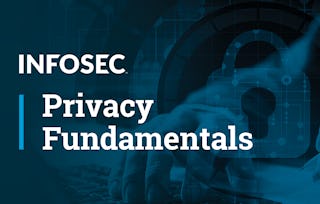Embark on the concluding course in our Privacy & Standardisation specialisation with this comprehensive capstone. Building on your existing expertise from previous courses—including Standardisation & Technology, Privacy in the Western World, Privacy in the USA, and Privacy in Europe—this capstone aims to deepen your understanding of contemporary privacy challenges.

Privacy & Standardisation Capstone
Seize the savings! Get 40% off 3 months of Coursera Plus and full access to thousands of courses.

Privacy & Standardisation Capstone
This course is part of Privacy and Standardisation Specialization

Instructor: Jan Smits
1,560 already enrolled
Included with
Recommended experience
What you'll learn
Create awareness for the role of privacy protection and the rule of law
Understand the differences between different jurisdictions and its implications for designing contracts and terms
Relate privacy and data protection to human rights and freedoms
Discover the precarious balance between technological advancement and privacy
Details to know

Add to your LinkedIn profile
See how employees at top companies are mastering in-demand skills

Build your subject-matter expertise
- Learn new concepts from industry experts
- Gain a foundational understanding of a subject or tool
- Develop job-relevant skills with hands-on projects
- Earn a shareable career certificate

There are 6 modules in this course
Welcome to the capstone on the specialisation on Privacy & Standardisation. This capstone will build on the knowledge you obtained in the courses: Standardisation & Technology, Privacy in the Western World, Privacy in the USA and Privacy in Europe. The capstone will help you build a comprehensive opinion and it will challenge you in all areas of present-day privacy protection. The assignments invite you to use and revisit the material of all the courses. This capstone will link historic milestones to current limitations and offer you a journey through jurisdictions and technological fields alike. Whereas in the previous courses you were assessed by quizzes, the capstone will require you to carefully consider all you have learned so far and detail your opinion. The assesment in this course will mainly be done by in-depth assignments. Use the few practice exercises well to give you a head start in the graded assignments!
What's included
1 video4 readings
Before diving into the legal elements of privacy and data protection it is important to recognize the structure of legal documents and relevance of passages. First, we encourage you to scan through the text and ensure you know what the different recitals and articles encompass. Remember in which articles specific information can be found. The following instruction and exercises will help you to find specific information and give you tools to study the reasoning in legal documents often hidden in plain sight.
What's included
1 video3 readings1 assignment1 peer review
Different companies value your privacy differently and for some companies your personal data has even become (the most important) part of their business model. And while you have probably encountered plenty of cookies and terms of services while navigating the web. All companies, also online, should oblige to the rule of law. These laws are designed to protect individuals and originate from basic (constitutional) rights and freedoms - see also the MOOC privacy in the Western World. We revisit the origin of our most important freedoms and use these for comparison in the modern-day field of privacy and data protection.
What's included
1 video6 readings1 assignment1 peer review
Special kind of data require special kind of attention. In both the USA and Europe regulations for processing personal medical data are very strict. We will challenge you to find the differences between both jurisdictions and determine the strictness of their regulations. The courses Privacy in the USA and Privacy in Europe provide background to the historic, societal and legal differences. Whereas many differences are present, pseudonymisation is key to protection of medical data in both regions. The International Standardisation Organisation provides a standard to do this. How is this intertwined with the obligations imposed by the healthcare regulations? Revisit the course Standardisation & Technology.
What's included
1 video6 readings1 assignment1 peer review
Hardware numbers, software numbers. Object numbers, identification numbers. Telephone numbers, order numbers. Which number are you? Searching algorithms, machine learning & artificial intellingence - computers use binary language to process, store and communicate data. As such it is not surprising that most of what we know in everyday life can be quantified. But do we realise how thoroughly impersonal and standardised our life can be described in numbers. What are the implications of the technological development and how do we fit humanity in? Explore the world of numbers in this module.
What's included
1 video1 reading1 peer review
Le grande finale. Use your knowledge from the entire specialization to switch position with the clerks and lawmakers. Experience the intricacies and difficulties of designing watertight contracts and terms yourself.
What's included
2 videos3 readings1 peer review
Earn a career certificate
Add this credential to your LinkedIn profile, resume, or CV. Share it on social media and in your performance review.
Explore more from Law
 Status: Free Trial
Status: Free Trial28DIGITAL
 Status: Free Trial
Status: Free Trial Status: Free Trial
Status: Free Trial Status: Preview
Status: PreviewNortheastern University
Why people choose Coursera for their career

Felipe M.

Jennifer J.

Larry W.

Chaitanya A.

Open new doors with Coursera Plus
Unlimited access to 10,000+ world-class courses, hands-on projects, and job-ready certificate programs - all included in your subscription
Advance your career with an online degree
Earn a degree from world-class universities - 100% online
Join over 3,400 global companies that choose Coursera for Business
Upskill your employees to excel in the digital economy
Frequently asked questions
To access the course materials, assignments and to earn a Certificate, you will need to purchase the Certificate experience when you enroll in a course. You can try a Free Trial instead, or apply for Financial Aid. The course may offer 'Full Course, No Certificate' instead. This option lets you see all course materials, submit required assessments, and get a final grade. This also means that you will not be able to purchase a Certificate experience.
When you enroll in the course, you get access to all of the courses in the Specialization, and you earn a certificate when you complete the work. Your electronic Certificate will be added to your Accomplishments page - from there, you can print your Certificate or add it to your LinkedIn profile.
Yes. In select learning programs, you can apply for financial aid or a scholarship if you can’t afford the enrollment fee. If fin aid or scholarship is available for your learning program selection, you’ll find a link to apply on the description page.
More questions
Financial aid available,
¹ Some assignments in this course are AI-graded. For these assignments, your data will be used in accordance with Coursera's Privacy Notice.

